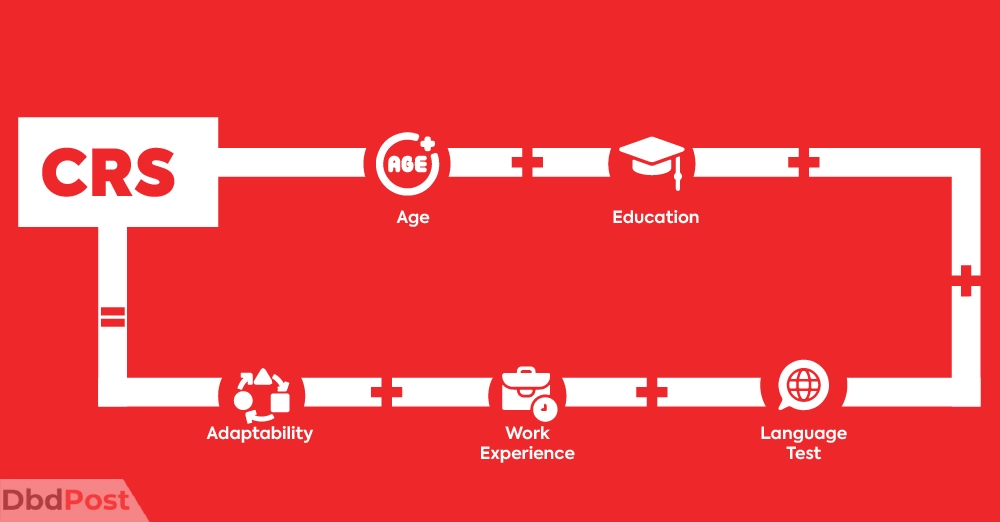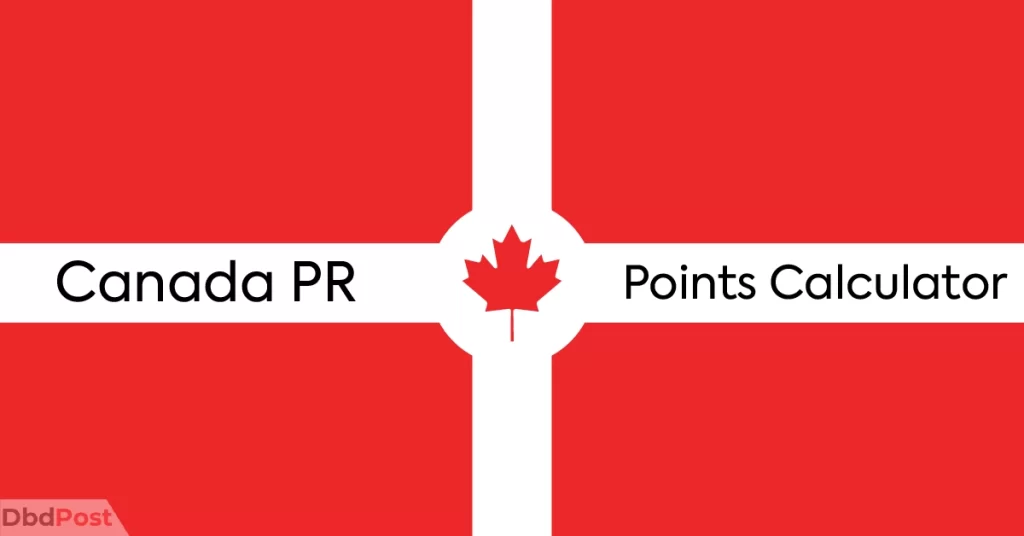Calculate your CRS (Comprehensive Ranking System) score with the Canada PR points calculator. The CRS score is crucial in determining an applicant’s eligibility and ranking for permanent residency in Canada.
Canada CRS points calculator helps you to calculate your CRS score quickly, accurately, and reliably. It considers the essential factors such as age, work experience, language skills, and education that affect an applicant’s overall eligibility.
Our team of expert consultants and lawyers has created this guide to help applicants understand how to maximize their CRS score.
With this Dbd guide, you can make informed decisions and take the necessary steps to improve your CRS score.
Calculate your Canada PR points

The Canada PR points, also known as the Comprehensive Ranking System (CRS) score, are crucial in determining an applicant’s eligibility for PR.
The CRS score is calculated based on age, education, language test, work experience, and adaptability.
A higher CRS score increases the chances of being selected in a draw and eventually obtaining permanent residency in Canada.
Complete CRS score breakdown
The CRS score plays a crucial role in Canada’s immigration system.
Below is a comprehensive breakdown table to better understand the CRS score. This table provides an in-depth look into the factors contributing to your overall score and the number of points each factor can earn you.
It’s important to note that some factors may have a higher point value for specific criteria than others. So, let’s examine the CRS score breakdown in detail. [1]Canada government, “CRS score breakdown, … Continue reading
| Factors | Maximum points | Description | Points without spouse/partner | Points with spouse/partner |
|---|---|---|---|---|
| Age | 110 without spouse and 100 with spouse | 17 years or less | 0 | 0 |
| 18 years | 99 | 90 | ||
| 19 years | 105 | 95 | ||
| 20 to 29 years | 110 | 100 | ||
| 30 years | 105 | 95 | ||
| 31 years | 99 | 90 | ||
| 32 years | 94 | 85 | ||
| 33 years | 88 | 80 | ||
| 34 years | 83 | 75 | ||
| 35 years | 77 | 70 | ||
| 36 years | 72 | 65 | ||
| 37 years | 66 | 60 | ||
| 38 years | 61 | 55 | ||
| 39 years | 55 | 50 | ||
| 40 years | 50 | 45 | ||
| 41 years | 39 | 35 | ||
| 42 years | 28 | 25 | ||
| 43 years | 17 | 15 | ||
| 44 years | 6 | 5 | ||
| 45 years or more | 0 | 0 | ||
| Education level | 150 without spouse and 140 with spouse | Less than secondary school | 0 | 0 |
| High school graduation | 30 | 28 | ||
| One-year degree | 90 | 84 | ||
| Two-year program certificates | 98 | 91 | ||
| Bachelor's degree | 120 | 112 | ||
| Two or more degrees | 128 | 119 | ||
| Master's degree | 135 | 126 | ||
| Doctoral level university degree (Ph.D.) | 150 | 140 | ||
| Canadian Language Benchmark (CLB) of first language (English) | 136 without spouse and 128 with spouse | Less than CLB 4 | 0 | 0 |
| CLB 4 or 5 | 6 | 6 | ||
| CLB 6 | 9 | 8 | ||
| CLB 7 | 17 | 16 | ||
| CLB 8 | 23 | 22 | ||
| CLB 9 | 31 | 29 | ||
| CLB 10 or more | 34 | 32 | ||
| CLB of second language (French) | 24 without spouse and 22 with spouse | CLB 4 or less | 0 | 0 |
| CLB 5 or 6 | 1 | 1 | ||
| CLB 7 or 8 | 3 | 3 | ||
| CLB 9 or more | 6 | 6 | ||
| Canadian work experience | 80 without spouse and 70 with spouse | None | 0 | 0 |
| 1 year | 40 | 40 | ||
| 2 years | 53 | 53 | ||
| 3 years | 64 | 64 | ||
| 4 years | 72 | 72 | ||
| 5 years or more | 80 | 80 | ||
| Spouse education level | 10 points | Less than secondary school | - | 0 |
| High school graduation | - | 2 | ||
| One-year degree | - | 6 | ||
| Two-year program certificates | - | 7 | ||
| Bachelor's degree | - | 8 | ||
| Two or more degrees | - | 9 | ||
| Master's degree | - | 10 | ||
| Doctoral level university degree (Ph.D.) | - | 10 | ||
| Spouse Canadian Language Benchmark (CLB) first language | 20 points | Less than CLB 4 | - | 0 |
| CLB 5 or 6 | - | 1 | ||
| CLB 7 or 8 | - | 3 | ||
| CLB 9 or more | - | 5 | ||
| Spouse's Canadian work experience | 10 points | None or less than a year | - | 0 |
| 1 year | - | 5 | ||
| 2 years | - | 7 | ||
| 3 years | - | 8 | ||
| 4 years | - | 9 | ||
| 5 years or more | - | 10 | ||
| Education with CLB 7 or more | 25 points | Secondary school | 0 | - |
| Post-secondary program (1year more) | 13 | - | ||
| Two or more post-secondary programs | 25 | - | ||
| Master’s level listed in the NOC Skill Level A | 25 | - | ||
| Ph.D. | 25 | - | ||
| Education with CLB 9 or more | 50 points | Secondary school | 0 | - |
| Post-secondary program (1year more) | 25 | - | ||
| Two or more post-secondary programs | 50 | - | ||
| Master’s level listed in the NOC Skill Level A | 50 | - | ||
| Ph.D. | 50 | - | ||
| Canadian work experience and a post-secondary degree with 1 year work experience | 25 points | Secondary school | 0 | - |
| Post-secondary program 1 year + | 13 | - | ||
| Two or more post-secondary program | 25 | - | ||
| Master’s level or at the level listed in NOC Skill level A | 25 | - | ||
| Ph.D. | 25 | - | ||
| Canadian work experience and a post-secondary degree with 2 years work experience | 50 points | Secondary school | 0 | - |
| Post-secondary program 1 year + | 25 | - | ||
| Two or more post-secondary program | 50 | - | ||
| Master’s level or at the level listed in NOC Skill level A | 50 | - | ||
| Ph.D. | 50 | - | ||
| Foreign work experience (with CLB 7 or more) in first official language | 25 points | No work experience | 0 | - |
| 1 or 2 years | 13 | - | ||
| 3 years or more | 25 | - | ||
| Foreign work experience (with CLB 9 or more) in first official language | 50 points | No work experience | 0 | - |
| 1 or 2 years | 25 | - | ||
| 3 years or more | 50 | - | ||
| Foreign work experience (Canadian work experience with 1 year) | 25 points | No work experience | 0 | - |
| 1 or 2 years | 13 | - | ||
| 3 years or more | 25 | - | ||
| Foreign work experience (Canadian work experience with 2 years) | 50 points | No work experience | 0 | - |
| 1 or 2 years | 25 | - | ||
| 3 years or more | 50 | - | ||
| Certificate of qualification on trade occupation | 25 points (CLB 5+) and 50 points (CLB 7+) | With CLB 5 or higher | 25 | - |
| With CLB 7 or higher | 50 | - | ||
| Additional points | 600 points | Brother or sister living in Canada with PR | 15 | - |
| Scored NCLC 7 or higher on all four French language skills and scored CLB 4 or lower in English (or didn’t take an English test) | 25 | - | ||
| Scored NCLC 7 or higher on all four French language skills and scored CLB 5 or higher on all four English skills | 50 | - | ||
| Post-secondary education in Canada (1 or 2 years) | 15 | - | ||
| Post-secondary education in Canada (3 years or longer) | 30 | - | ||
| Arranged employment – NOC TEER 0 Major group 00 | 200 | - | ||
| Arranged employment – NOC TEER 1, 2 or 3, or any TEER 0 other than Major group 00 | 50 | - | ||
| Provincial or territorial nomination | 600 | - | ||
| Grand total | 1200 |
Factors that affect the Canada PR points

Knowing the importance of each factor in point accumulation can help you improve your score on the Canada points calculator.
The maximum score possible is 1200 points totaling from several factors in CSR points-based system.
All Points are accumulated from each section of the CRS: age, education, language proficiency, work experience, etc.
Understanding these factors helps you improve which parts of your profile need attention.
1. Age
Age plays an important role in applying for permanent residency in Canada. The maximum points you can get without a spouse is 110, while with a spouse is only 100 points.[2]Canada government, “Age CRS, … Continue reading
For the full score, you must be between 20 to 29 years old. It’s important to remember these numbers when applying for PR.
2. Education
It’s best to apply with a Bachelor’s degree or higher. Those give you the most points. Without a spouse or common-law partner, you can get up to 150 points for your education alone, whereas, with a spouse, it’s 140.
Plus, having multiple degrees can earn you up to 50 extra points. [3]Canada government, “Education CRS, … Continue reading
3. Language proficiency

To get the highest Canadian Express Entry System score, you need to prove your proficiency in English, French, or both.
Points are awarded based on the Canadian Language Benchmark (CLB) assessment. Proficiency in English is mandatory, but proficiency in French is optional.
For English as a first language, you can score up to 136 points without a spouse and 128 points with a spouse. For French as a second language, you can score 24 points without a spouse and 22 points with a spouse. [4]Canada government, “English CLB, … Continue reading
However, proficiency in both languages can give you a competitive advantage in the Canadian PR application process.
4. Work experience
If you have Canadian work experience, you may receive up to 80 points toward your eligibility for Canadian permanent residency through the CIC Canada PR points calculator.
Even without Canadian work experience, foreign work experience can earn up to 50 points.
It’s important to have proof of your work experience, such as verified certificates and salary sheets, available when applying for PR.
5. Canadian job offer

One factor you should keep in mind is having a job offer or arranged employment in Canada. Though optional, you could get 50 to 200 CRS points on the Canada Express Entry calculator. [5]Canada government, “Arranged employment, … Continue reading
The number of points depends on the type of valid job offer and the National Occupational Classification Code (NOC).
So, if you’re looking to apply for a PR visa, finding a well-matching Canadian job offer is an important step.
6. Canadian work experience
One way to boost your score is to have an education complementing Canadian work experience. If you have equivalent work experience, this could help your CRS points even more.
Also, depending on your work experience, you can earn an extra 50 points on the Canada immigration score calculator.
7. Common law partner traits
Your common-law partner’s traits, such as language proficiency and work experience, can positively impact your Comprehensive Ranking System (CRS) score.
Moreover, your spouse’s higher education can result in up to 10 points, and Canadian work experience can add another 10 points to your score. Additionally, a CLB score can earn you an extra 20 points. [6]Canada government, “CRS spouse education, … Continue reading
All of these factors can enhance your chances of obtaining permanent residency in Canada.
8. Provincial nomination
Provincial nomination can give you a massive score of up to 600 points on the Comprehensive Ranking System. But it’s not just anyone who can get nominated; first, you must be eligible. [7]Canada government, “PNP requirement, https://www.canada.ca/en/immigration-refugees-citizenship/services/immigrate-canada/provincial-nominees/works.html”
You’ll need to meet specific criteria and provide the correct documents.
9. Other additional factors
Finally, additional factors can increase your CRS points for PR application. Having siblings living in Canada can add 15 points, and completing an education in Canada can add up to 30 points.
Why do your Canada PR points matter?
The Canada PR points allocated through the Express Entry system are crucial in determining an applicant’s eligibility and ranking for PR.
A higher Comprehensive Ranking System (CRS) score calculator, the Canada PR eligibility calculator, increases the chances of being selected in a draw.
Only the best-ranked candidates are nominated through these draws. Those who do not meet the criteria are sent back to the pool and must wait for future PR draws.
How to maximize the CRS score

If you want to maximize your Comprehensive Ranking System (CRS) score, you can do many things. Let’s look into additional steps you can do to improve the CRS score.
- The perfect age for applying is between 20 to 29 years, as this range gives you the most CRS score. So, try to apply for Canadian PR within this age range.
- First, make sure that you have the best language abilities possible. Improving either English or French will give your score a boost. Retake tests if you’re not satisfied with the results.
- You can also add certificates or diplomas to your arsenal by completing courses or going to accredited institutes.
- Secondly, add more job experience to your resume since employers like to hire people who already have experience in the field.
- Next, getting an employment offer from a Canadian employer will help raise your CRS score.
- Also, do not forget to apply for the Provincial Nominee Program if you’re eligible. It’s a great way to increase your CRS score even more.
- Sibling living in Canada with a PR is another advantage to improving your score.
- Lastly, if you’re married and applying with a spouse, you can boost their skills. The Canadian government will also consider the skill level of language, work experience, and education.
With these different tips, you’ll be able to maximize your CRS score and get one step closer to becoming a Canadian permanent resident.
Related Stories
- Find the various best consultancy for Canada PR in our guide if you need expert guidance for your Canada PR application.
- Want to work and live in Canada? A work permit visa may be the solution for you; check out our guide – here.
- Learn the steps and requirements to meet to obtain PR in Canada.
- If you’re looking for an efficient way to immigrate to Canada, our guide on Express Entry Canada is worth considering.
- Want to immigrate to Canada? Learn about the Canada PR requirements.
FAQs
How do I calculate the CRS score on the Canada PR points calculator?
You can calculate the CRS score using the Canadian Government’s official tool on their website or ask a professional for assistance.[8]Canada government, “CRS tool, https://www.cic.gc.ca/english/immigrate/skilled/crs-tool.asp#:~:text=other%20factors-,Use%20this%20tool%20if%3A,-you%E2%80%99re%20eligible%20for”
How many points are required for Canada Express Entry?
You’ll need at least 67 points out of a possible 100 for your Express Entry profile to be considered.
These points are based on things like your work experience and education level. It’s important to ensure you meet all the requirements so your application can be accepted. [9]Canada government, “Selection factors, … Continue reading
What is the minimum CRS score for Canada PR?
There is no definite score to qualify for PR. It depends on the CRS score of other Express Entry candidates in the Express Entry pool.
How can I get maximum PR points?
You can maximize PR points by applying within the ideal age range, improving language abilities, education and job experience, and more.
These tips can help increase your CRS score and increase your chances of becoming a permanent resident in Canada.
What is the total CRS score on a Canada PR points calculator?
The total Comprehensive Ranking System (CRS) score is between 0 and 1200. The CRS score is calculated based on factors such as age, education, language proficiency, work experience, etc. [10]Canada government, “Maximum CRS points, … Continue reading
Final thoughts
We hope the Canada PR points calculator and Dbd guide have helped you understand entirely the CRS score and the various factors contributing to it.
Also, the Canada PR score calculator is accurate, reliable, and updated timely.
By following the advice and guidance provided, you can make informed decisions with the necessary steps to achieve Canada PR.
- 107shares
- Facebook Messenger
About the author
DbdPost Staff is a team of writers and editors working hard to ensure that all information on our site is as accurate, comprehensive, and trustworthy as possible.
Our goal is always to create the most comprehensive resource directly from experts for our readers on any topic.




